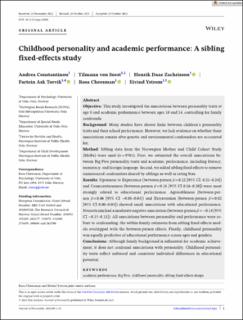| dc.contributor.author | Constantinou, Andrea | |
| dc.contributor.author | von Soest, Tilmann Martin | |
| dc.contributor.author | Zachrisson, Henrik Daae | |
| dc.contributor.author | Torvik, Fartein Ask | |
| dc.contributor.author | Cheesman, Rosa Catherine Gillespie | |
| dc.contributor.author | Ystrøm, Eivind | |
| dc.date.accessioned | 2023-12-05T06:49:57Z | |
| dc.date.available | 2023-12-05T06:49:57Z | |
| dc.date.created | 2023-11-30T14:23:26Z | |
| dc.date.issued | 2023 | |
| dc.identifier.citation | Journal of Personality. 2023, 1-13. | en_US |
| dc.identifier.issn | 0022-3506 | |
| dc.identifier.uri | https://hdl.handle.net/11250/3105893 | |
| dc.description.abstract | Objective: This study investigated the associations between personality traits at
age 8 and academic performance between ages 10 and 14, controlling for family
confounds.
Background: Many studies have shown links between children’s personality
traits and their school performance. However, we lack evidence on whether these
associations remain after genetic and environmental confounders are accounted
for.
Method: Sibling data from the Norwegian Mother and Child Cohort Study
(MoBa) were used (n = 9701). First, we estimated the overall associations be-
tween Big Five personality traits and academic performance, including literacy,
numeracy, and foreign language. Second, we added sibling fixed effects to remove
unmeasured confounders shared by siblings as well as rating bias.
Results: Openness to Experience (between-person β = 0.22 [95% CI: 0.21–0.24])
and Conscientiousness (between-person β = 0.18 [95% CI 0.16–0.20]) were most
strongly related to educational performance. Agreeableness (between-per-
son β = 0.06 [95% CI −0.08–0.04]) and Extraversion (between-person β = 0.02
[95% CI 0.00–0.04]) showed small associations with educational performance.
Neuroticism had a moderate negative association (between-person β = −0.14 [95%
CI −0.15–0.11]). All associations between personality and performance were ro-
bust to confounding: the within-family estimates from sibling fixed-effects mod-
els overlapped with the between-person effects. Finally, childhood personality
was equally predictive of educational performance across ages and genders.
Conclusions: Although family background is influential for academic achieve-
ment, it does not confound associations with personality. Childhood personal-
ity traits reflect unbiased and consistent individual differences in educational
potential. | en_US |
| dc.language.iso | eng | en_US |
| dc.rights | Navngivelse 4.0 Internasjonal | * |
| dc.rights.uri | http://creativecommons.org/licenses/by/4.0/deed.no | * |
| dc.title | Childhood personality and academic performance: A sibling fixed-effects study | en_US |
| dc.type | Peer reviewed | en_US |
| dc.type | Journal article | en_US |
| dc.description.version | publishedVersion | en_US |
| cristin.ispublished | true | |
| cristin.fulltext | original | |
| cristin.qualitycode | 2 | |
| dc.identifier.doi | https://doi.org/10.1111/jopy.12900 | |
| dc.identifier.cristin | 2206593 | |
| dc.source.journal | Journal of Personality | en_US |
| dc.source.pagenumber | 1-13 | en_US |
| dc.relation.project | Norges forskningsråd: 288083 | en_US |
| dc.relation.project | EC/H2020/818425 | en_US |
| dc.relation.project | Norges forskningsråd: 336078 | en_US |
| dc.relation.project | EU – Horisont Europa (EC/HEU): 101045526 | en_US |
| dc.relation.project | Norges forskningsråd: 300668 | en_US |
| dc.relation.project | Norges forskningsråd: 325245 | en_US |
| dc.relation.project | Norges forskningsråd: 262177 | en_US |
| dc.relation.project | Norges forskningsråd: 273659 | en_US |
| dc.relation.project | Norges forskningsråd: 331640 | en_US |
| dc.relation.project | Norges forskningsråd: 262700 | en_US |

